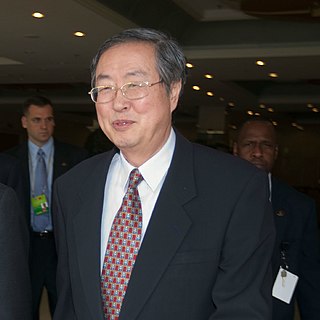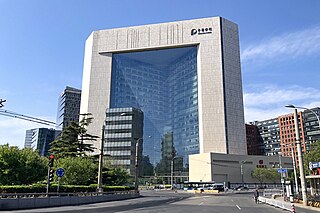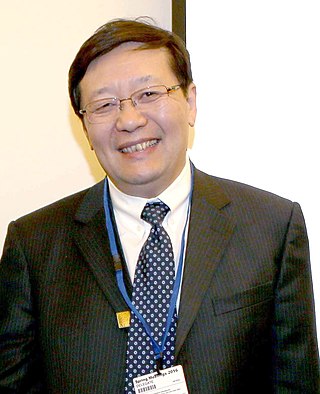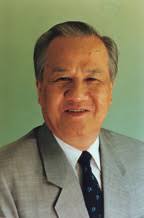
The Ministry of Finance of the People's Republic of China is the constituent department of the State Council of the People's Republic of China which administers macroeconomic policies and the annual budget. It also handles fiscal policy, economic regulations and government expenditure for the state. The ministry also records and publishes annual macroeconomic data on China's economy. This includes information such as previous economic growth rates in China, central government debt and borrowing and many other indicators regarding the economy of mainland China.

China Development Bank (CDB) is a policy bank of China under the State Council. Established in 1994, it has been described as the engine that powers the national government's economic development policies. It has raised funds for numerous large-scale infrastructure projects, including the Three Gorges Dam and the Shanghai Pudong International Airport.
Central Huijin Investment Ltd. is a Chinese sovereign fund company under the China Investment Corporation owned by the State Council of China.

Zhou Xiaochuan is a Chinese economist. Zhou served as the governor of the People's Bank of China from 2002 to 2018.
Go Out policy or the Going Global Strategy is the People's Republic of China's current strategy to encourage its enterprises to invest overseas. The policy was announced as a national strategy by Jiang Zemin in March 2000.

Zeng Peiyan is a Chinese politician. He was a member of the Politburo of the Chinese Communist Party from 2002 to 2007 and was a vice premier from 2003 to 2008.
Chen Yuan is a Chinese economist who is the current chairman of the China Association for International Friendly Contact (CAIFC). He was previously the chairman of the China Development Bank from March 1998 to April 2013. Chen Yuan then served as Vice Chairman of the National Committee of the Chinese People's Political Consultative Conference from 2013 to 2018. He is the eldest son of former Vice Premier Chen Yun.

The State Administration of Foreign Exchange (SAFE) of the People's Republic of China is an administrative agency under the State Council tasked with drafting rules and regulations governing foreign exchange market activities, and managing the state foreign-exchange reserves, which at the end of December 2016 stood at $3.01 trillion for the People's Bank of China. The current director is Zhu Hexin.
H shares refer to the shares of companies incorporated in mainland China that are traded on the Hong Kong Stock Exchange. Many companies float their shares simultaneously on the Hong Kong market and one of the two mainland Chinese stock exchanges in Shanghai or Shenzhen, they are known as A+H companies.

China Investment Corporation (CIC) is a sovereign wealth fund that manages part of China's foreign exchange reserves. China's largest sovereign fund, CIC was established in 2007 with about US$200 billion of assets under management, a number that grew to US$1.2 trillion in 2021 and US$1.3 trillion in December 2024.

Lou Jiwei, is a Chinese politician, and current director of the 13th CPPCC Foreign Affairs Committee. Lou was Chairman of China's National Council for Social Security Fund, Minister for Finance, Chairman of China Investment Corporation and Central Huijin Investment, Vice Minister of Finance of China and Vice-Governor of Guizhou.
National champions are corporations which are technically private businesses but due to governmental policy are ceded a dominant position in a national economy. In this system, these large organizations are expected not only to seek profit but also to "advance the interests of the nation"; the government sets policies which favor these organizations. The policy is practiced by many governments, in some sectors more than others, but by giving an unfair advantage against market competition, the policy promotes economic nationalism domestically and global pre-eminence abroad contrary to the free market. The policy also deters or prevents venture capitalism.

The State-owned Assets Supervision and Administration Commission of the State Council (SASAC) is a special commission of the People's Republic of China, directly under the State Council. It was founded in 2003 through the consolidation of various other industry-specific ministries. SASAC is responsible for managing state-owned enterprises (SOEs), including appointing top executives and approving any mergers or sales of stock or assets, as well as drafting laws related to SOEs.
The Export–Import Bank of China is a policy bank of China under the State Council. Established in 1994, the bank was chartered to implement the state policies in industry, foreign trade, economy, and foreign aid to other developing countries, and provide policy financial support so as to promote the export of Chinese products and services.

Chen Jinhua was a Chinese politician. Chen joined the Chinese Communist Party (CCP) in February 1949 and studied at Renmin University of China from 1953 to 1955 and from 1960 to 1962. From the 1950s through the 1970s, he served in positions of increasing responsibility in China's former Ministry of Textile Industry and Ministry of Light Industry. From 1977 to 1983, Chen served on the Standing Committee of the Shanghai Municipal People's Congress, as well as deputy secretary of the Shanghai CCP Committee. From 1983 to 1990, he served as the general manager and CCP committee secretary of state-owned oil company Sinopec.

The Silk Road Fund is a China Government Guidance Fund to foster increased investment in countries along the Belt and Road Initiative, an economic development initiative primarily covering Eurasia. The Chinese government pledged US$40 billion for the creation of the investment fund, established on 29 December 2014.
The International Forum of Sovereign Wealth Funds (IFSWF) is a nonprofit international group of sovereign wealth funds managers which was established in 2009. It is based in London, England.
Policy bank (政策性银行), or policy lender, refers to non-profit professional financial institutions established by the Chinese government with the goal of implementing the government's economic policies and carrying out financial business in specific fields. This measure separates policy finance from commercial finance and establishes a policy bank to undertake strictly defined policy businesses. Policy banks' sources of funds mainly rely on issuing financial bonds or borrowing from the central bank, and generally do not accept deposits from the public.
Sovereign funds of China are mechanisms through which the Chinese state acts as a market participant with the goals of supporting key domestic economic sectors, advancing strategic interests internationally, and diversifying its foreign exchange reserves.
Peng Chun is a Chinese bureaucrat and the chairman of China Investment Corporation, one of China's sovereign funds.










